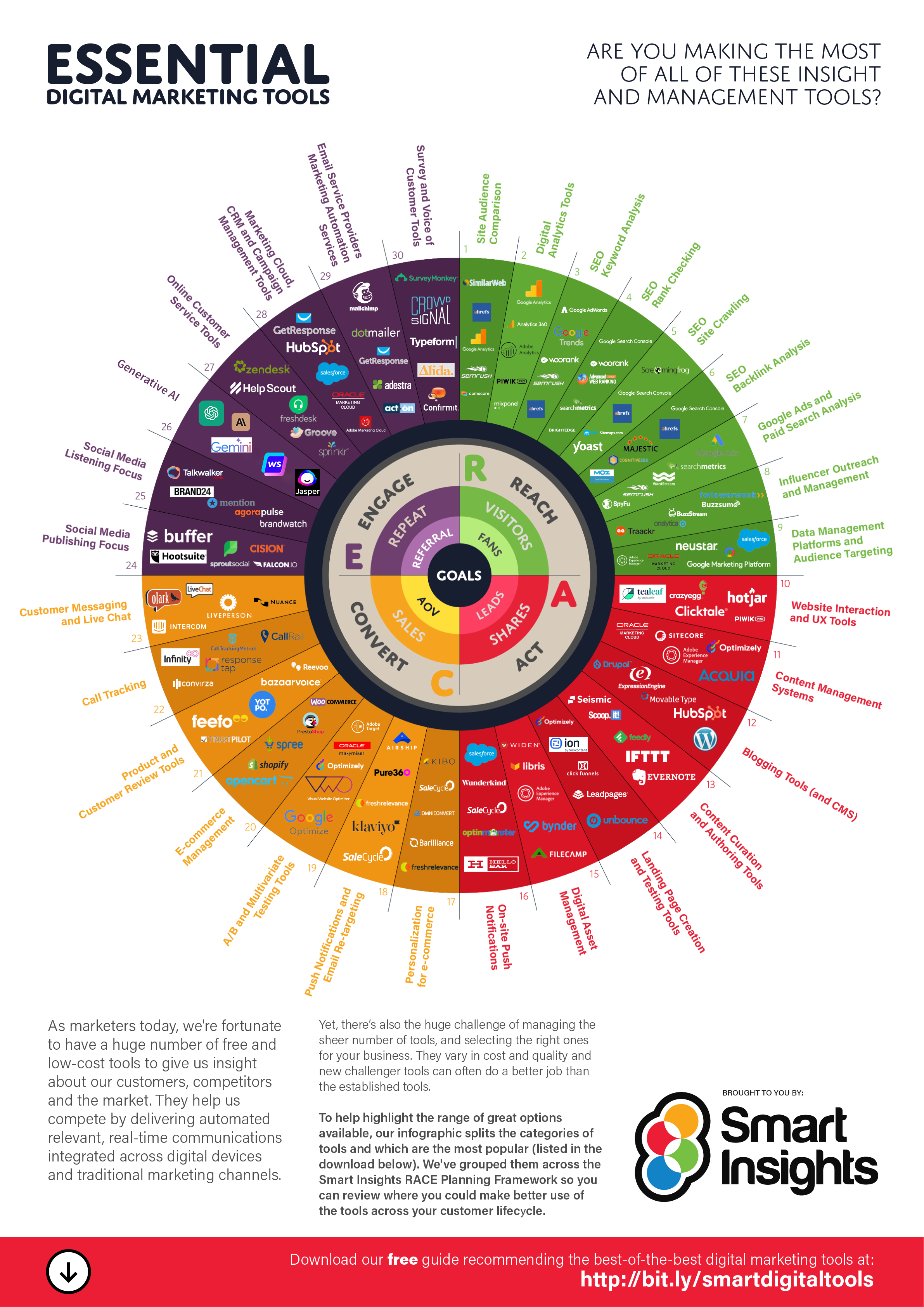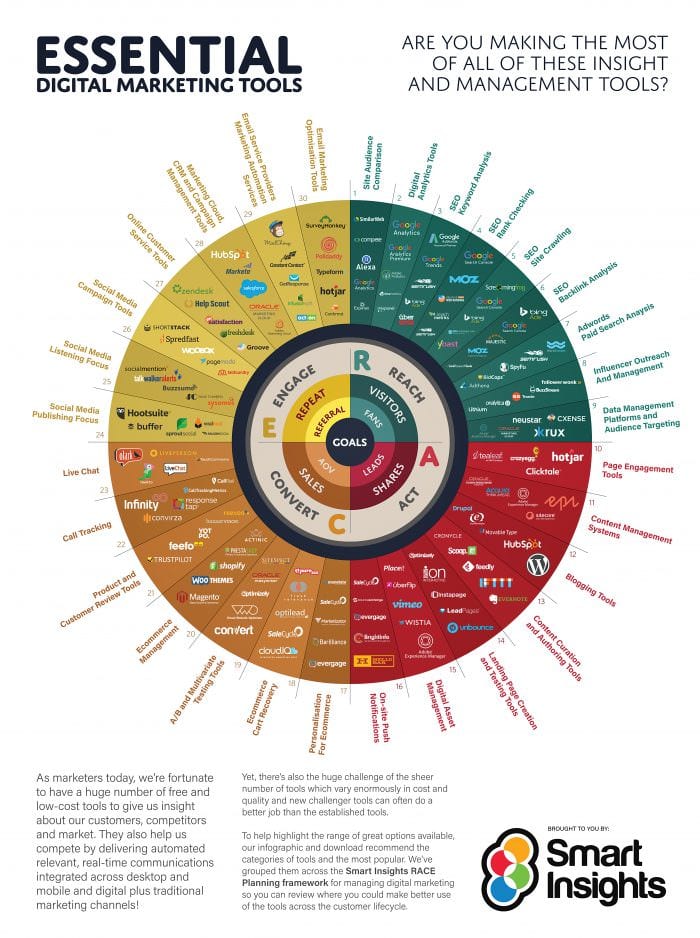Digital marketing tools are essential in today’s competitive online landscape. They help streamline tasks, enhance productivity, and optimize marketing efforts.
Digital marketing tools have become indispensable for businesses aiming to thrive online. These tools offer various functionalities, from SEO optimization and social media management to content creation and analytics. With the right tools, marketers can save time, increase efficiency, and improve their online presence. One tool that stands out in revolutionizing blogging is Blogify. Blogify transforms videos, audios, and documents into SEO-friendly blog posts, automates social media updates, and generates affiliate links. It even supports blogging in over 150 languages. By leveraging such advanced tools, businesses can enhance their digital marketing strategies and achieve their goals more effectively.

Credit: www.smartinsights.com
Introduction To Digital Marketing Tools
In the modern digital era, marketing strategies have evolved significantly. Digital marketing tools are essential for businesses to thrive online. These tools help manage, analyze, and optimize marketing efforts efficiently. Understanding digital marketing tools is crucial for anyone looking to enhance their online presence.
What Are Digital Marketing Tools?
Digital marketing tools are software applications designed to assist with various marketing tasks. They help in creating, executing, and analyzing marketing campaigns. These tools cover a wide range of functions, including:
- SEO optimization
- Content creation
- Social media management
- Email marketing
- Analytics and reporting
One such tool is Blogify. Blogify is an advanced AI-powered solution. It streamlines content creation for bloggers. It converts various media types into SEO-optimized blog posts. This includes videos, audios, podcasts, PDFs, and docs. Blogify also manages affiliate links and automates social media postings.
Importance Of Digital Marketing Tools In Today’s Online Landscape
Digital marketing tools are vital in today’s competitive online landscape. They offer several benefits that make them indispensable:
- Efficiency: These tools automate repetitive tasks. This frees up time for strategic planning.
- Data-Driven Decisions: Analytics tools provide valuable insights. They help optimize marketing strategies.
- Cost-Effectiveness: Many tools offer affordable pricing plans. They provide great value for money.
- Reach: Tools like Blogify support multilingual blogging. This helps reach a global audience.
For instance, Blogify offers:
| Feature | Description |
|---|---|
| Media to Blog Conversion | Converts videos, audios, and more into SEO-optimized posts |
| Auto-Affiliate Link Generation | Automatically matches keywords with affiliate links |
| Social Media Automation | Synchronizes platforms and schedules posts |
| Analytics and Insights | Provides comprehensive blog performance data |
| Scheduled Blogging | Allows planning and automation of content publication |
| Multilingual Blogging | Supports over 150 languages |
These features highlight the importance of integrating such tools into your digital marketing strategy.

Credit: red-website-design.co.uk
Key Features Of Top Digital Marketing Tools
Digital marketing tools are essential for enhancing online presence and boosting productivity. These tools offer a variety of features that cater to different aspects of digital marketing, ensuring efficiency and effectiveness. Below, we explore the key features of top digital marketing tools.
Seo Optimization And Analysis
SEO tools help improve your website’s visibility on search engines. They offer keyword research, on-page optimization, and backlink analysis. Blogify, for instance, converts various media into SEO-optimized blog posts, making it easier to rank higher on search engines.
Social Media Management
Managing multiple social media accounts can be time-consuming. Social media management tools automate scheduling and posting, saving you time. Blogify synchronizes social media platforms and schedules posts, ensuring consistent engagement with your audience.
Content Creation And Curation
Creating engaging content is crucial for attracting and retaining audience attention. Tools like Blogify streamline content creation by converting videos, audios, PDFs, and more into blog posts. This feature simplifies the blogging process and ensures content is SEO-optimized.
Email Marketing Automation
Email marketing tools automate email campaigns, making it easier to connect with your audience. They offer features like segmentation, personalized emails, and performance tracking. This automation enhances communication and increases campaign effectiveness.
Analytics And Reporting
Analytics tools provide insights into your digital marketing efforts. They track performance, audience engagement, and conversion rates. Blogify offers comprehensive analytics on blog performance, helping you make data-driven decisions to optimize your content strategy.
Customer Relationship Management (crm)
CRM tools help manage and analyze customer interactions. They offer features like contact management, sales tracking, and customer support. These tools enhance customer relationships and improve overall business efficiency.
Pricing And Affordability Breakdown
Understanding the pricing and affordability of digital marketing tools is crucial for choosing the right solution. In this section, we will explore the various aspects of pricing for digital marketing tools, focusing on free vs. paid tools, subscription models, and the cost-benefit analysis for small businesses versus enterprises.
Free Vs. Paid Tools: What To Expect
Free tools often provide basic functionalities that are essential for starting out. They are useful for small businesses or individuals who are looking to test the waters of digital marketing without a significant investment. However, free tools may have limitations such as:
- Limited features
- Usage caps
- Ads and branding
Paid tools, on the other hand, offer more comprehensive features and greater flexibility. They are ideal for businesses that require advanced functionalities and higher usage limits. Advantages of paid tools include:
- Access to premium features
- Higher limits on usage
- No ads or branding
- Dedicated customer support
Subscription Models And Pricing Tiers
Digital marketing tools usually offer various subscription models and pricing tiers to accommodate different needs and budgets. Blogify, for instance, provides three one-time payment plans:
| Plan | Price | Features |
|---|---|---|
| Plan 1 | $79 |
|
| Plan 2 | $158 |
|
| Plan 3 | $237 |
|
Cost-benefit Analysis For Small Businesses Vs. Enterprises
The cost-benefit analysis varies significantly between small businesses and enterprises. For small businesses, the focus is often on affordability and essential features. Blogify’s Plan 1 at $79 is an attractive option, offering the necessary tools for a manageable cost.
Enterprises, on the other hand, might require more advanced features and higher limits. Blogify’s Plan 3 at $237 provides extensive capabilities, such as copilot blog creation and higher upload sizes, which can justify the higher price.
In conclusion, understanding the pricing and affordability of digital marketing tools like Blogify is essential for making informed decisions. By comparing free and paid tools, examining subscription models, and performing a cost-benefit analysis, businesses can select the best tool to meet their specific needs.
Pros And Cons Of Using Digital Marketing Tools
Digital marketing tools have transformed how businesses connect with their audience. These tools offer numerous benefits but also come with some challenges. Let’s explore the advantages and disadvantages of using digital marketing tools.
Advantages: Efficiency, Reach, And Data-driven Decisions
Digital marketing tools like Blogify provide remarkable efficiency. They automate content creation, social media posting, and affiliate link management, saving significant time. For instance, Blogify converts various media types into SEO-optimized blog posts, making the blogging process smoother and quicker.
Another advantage is the extensive reach. Tools supporting multilingual blogging, such as Blogify, allow businesses to connect with diverse audiences globally. This feature is crucial for expanding a brand’s reach beyond local boundaries.
Data-driven decisions are a significant benefit. Digital marketing tools often come with comprehensive analytics and insights. Blogify, for example, offers detailed analytics on blog performance and audience engagement, enabling users to optimize their content strategy effectively.
Disadvantages: Learning Curve, Costs, And Potential Over-reliance
One of the notable disadvantages is the learning curve. Despite the benefits, mastering digital marketing tools can take time. Users need to invest effort to understand all features and functionalities.
Costs can be another drawback. While some tools offer free versions, advanced features often come at a price. Blogify, for instance, has different pricing plans ranging from $79 to $237. These costs might be a concern for small businesses or individual bloggers.
Potential over-reliance is also a risk. Relying too much on digital tools might reduce creativity and human touch in content. It’s essential to balance automation with genuine, human-generated content to maintain authenticity.
Specific Recommendations For Ideal Users Or Scenarios
Choosing the right digital marketing tools can be challenging. Different tools suit different needs and scenarios. Here are some specific recommendations based on user types and scenarios.
Best Tools For Small Businesses
Small businesses often have limited resources and budgets. Choosing tools that offer the most value is crucial. Here are some ideal tools for small businesses:
- Hootsuite: Perfect for social media management. Schedule posts and monitor engagement.
- Mailchimp: Great for email marketing. Offers free plans and easy-to-use templates.
- Canva: Ideal for creating marketing materials. User-friendly and has many free design options.
Recommended Tools For E-commerce Platforms
E-commerce platforms require tools that can handle product listings, customer management, and sales tracking. Here are some top recommendations:
- Shopify: Comprehensive e-commerce solution. Provides everything from product listings to payment processing.
- Google Analytics: Essential for tracking website traffic and user behavior. Free and powerful.
- Klaviyo: Tailored for email marketing. Integrates well with e-commerce platforms and offers advanced segmentation.
Top Tools For Content Creators And Bloggers
Content creators and bloggers need tools that streamline the content creation process and enhance SEO. Here are some must-have tools:
- Blogify: Transforms various media into SEO-optimized blog posts. Automates social media posting and manages affiliate links.
- Grammarly: Ensures content is error-free. Provides grammar, punctuation, and style suggestions.
- Yoast SEO: Optimizes blog posts for search engines. Offers real-time SEO analysis and suggestions.
Ideal Tools For Large Enterprises And Corporations
Large enterprises and corporations need robust and scalable tools. These tools must handle large volumes of data and integrate with other systems. Here are some top recommendations:
- Salesforce: Comprehensive CRM solution. Manages customer relationships, sales, and marketing automation.
- Marketo: Advanced marketing automation platform. Ideal for lead management and campaign tracking.
- HubSpot: All-in-one marketing, sales, and service platform. Integrates well with other enterprise systems.

Credit: www.smartinsights.com
Frequently Asked Questions
What Are Popular Digital Marketing Tools?
Popular digital marketing tools include Google Analytics, SEMrush, Ahrefs, Hootsuite, and Mailchimp. These tools help in analytics, SEO, social media management, and email marketing.
How Do Digital Marketing Tools Improve Strategy?
Digital marketing tools improve strategy by providing insights, tracking performance, and automating tasks. They enable data-driven decisions and efficient marketing efforts.
Are Digital Marketing Tools Expensive?
Digital marketing tools vary in cost. Some offer free versions with basic features, while others have premium plans. Choose tools based on your budget and needs.
Which Tool Is Best For Seo?
Ahrefs and SEMrush are considered the best for SEO. They provide comprehensive keyword research, backlink analysis, and competitor insights to improve search engine rankings.
Conclusion
Digital marketing tools streamline and enhance your online strategy. They save time and increase productivity. One such tool is Blogify. It converts media into SEO-friendly blog posts. Blogify also automates social media and affiliate links. Want to simplify your blogging? Check out Blogify here. Invest in the right tools for better results.








